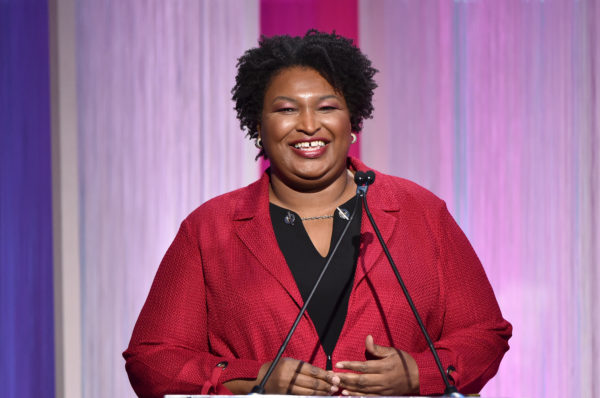Stacey Abrams is once again being hailed the supreme voting registration hero.
Nearly every eligible voter in Georgia is registered, 95 percent, according to a comprehensive 2020 election administration and voting report. The November election cycle had a reported 7.19 million voters registered, with just over 69 percent casting ballots in the race for president and Georgia’s two Senate seats.

Enthusiastic Abrams followers believe her grassroots organization Fair Fight and efforts to get voters registered is to thank for the surge in registrants.
One user tweeted, “The Georgia GOP is about to be sorry they stole the 2018 gubernatorial election from Stacey Abrams. F*ck around and find out, colonizers…”
Another added, “95% of Georgians over 18 are now registered to vote – largely because of the hard work put in by Stacey Abrams to make that happen.”
Abrams herself acknowledged the milestone by reminding voters the fight to cast their ballots is far from over. She posed the following questions while imploring Georgians to “stay the course.”
- Can you register & stay on the rolls?
- Can you cast a ballot?
- Does your ballot get counted?
The former Georgia gubernatorial candidate has remained a fixture in the fight against voter suppression since 2018 — when she lost the race for governor against Brian Kemp by a margin of less than 55,000 votes. Abrams claimed Kemp, who at the time was secretary of state and responsible for overseeing the election, used countless voter suppression tactics predominantly against non-white voters. Those actions included purging more than 500,000 people from voter rolls, stalling voter registration applications, and countless issues at voting precincts impacting Black communities abilities to cast a ballot.
“Voter suppression, it works by convincing people in practice that they don’t count. It is designed to silence those voices, say that there are people that do not count,’ said Abrams after ending her campaign. She then launched a lawsuit against the state’s election officials, including Kemp, challenging the elections infrastructure.
“Voter suppression happens in every election, in every state. I need you all to talk about voter suppression all the time. We need to talk about voter suppression the way we talk about the Kardashians…with such insistence that people have to respond.”
According to the report, active registration rates from 2016 to 2020 increased by 24.5 percent. Only 10 percent of voters with a criminal conviction or incarceration that prevented them from being eligible to voter were purged from records.
Abrams’ continued to push to organize early registration and voting efforts had an substantial impact on the overall turnout of voters for the November general election. A record-breaking 5 million people cast ballots despite the pandemic and continued voting infrastructure issues that again caused thousands to be purged from rolls and turned away at precincts.
Despite Abrams’ followers heralding her as voting rights change-maker, the report clearly shows the increase of registrants is actually tied back to Kemp. In 2016 Kemp, then secretary of state, implemented a new policy allowing those obtaining a driver’s license to be automatically registered to vote. Those voters make up at least 67 percent of total registered voters.
Kemp’s critics believe his own policy change will be part of his undoing, and possibly make way for Abrams to vie for the governor’s seat. The governor, who has often found himself a trending topic on social media, has fueled criticism for his administration’s voter rolls purge of 100,000 in recent days and his continued stance against issuing mask mandates amid the increasing COVID-19 delta variant cases.
“Very possible that Brian Kemp ended his own career way back in 2016,” wrote one user.
In 2022 Georgia will vote to either re-elect Kemp or choose a new governor. The election cycle will be pivotal to the state as voters will also cast ballots to determine if Sen. Raphael Warnock will maintain his seat.
If voter registration maintains or even surpasses its current rate the outcome could be huge for the historically red state that turned blue last year.


